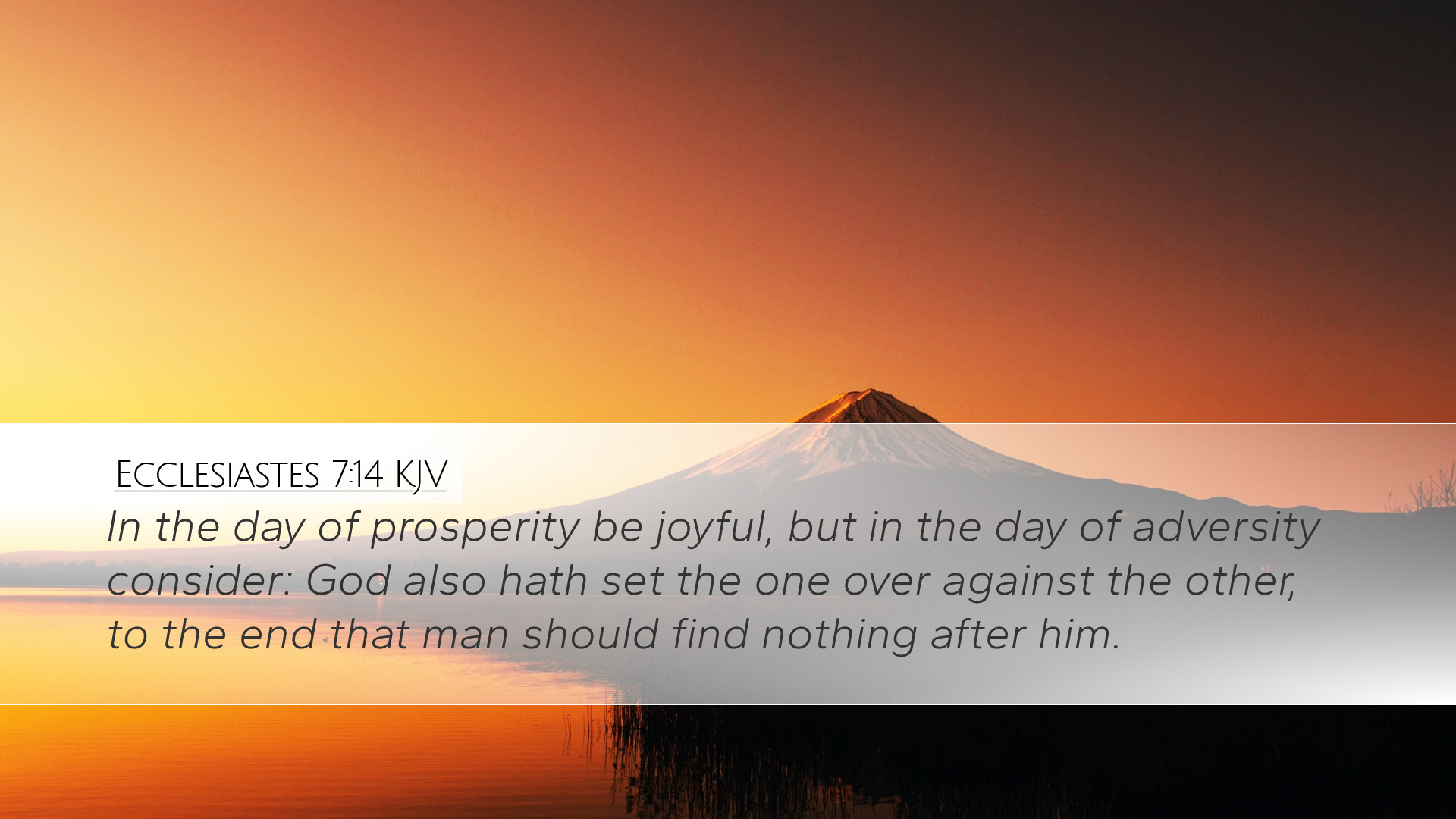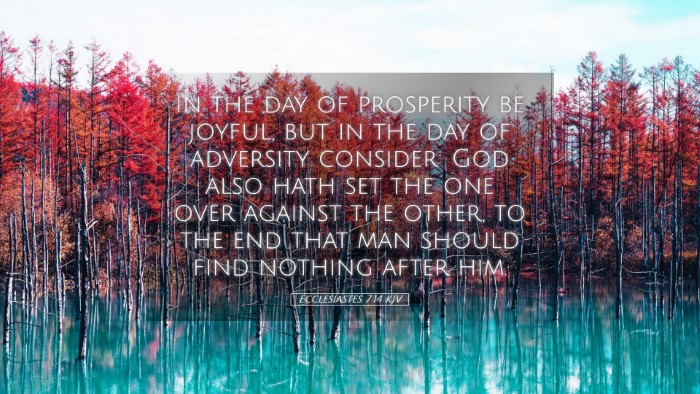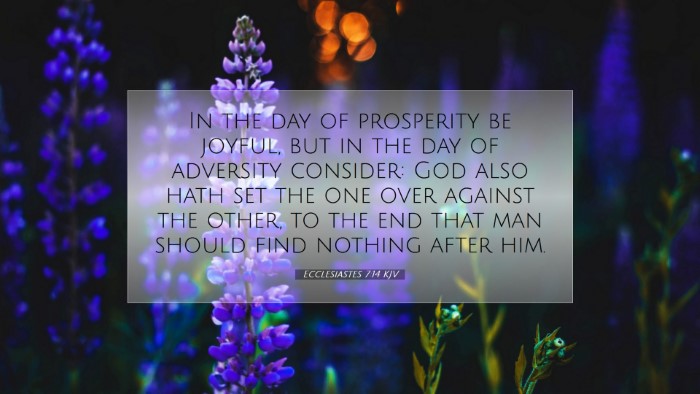Commentary on Ecclesiastes 7:14
Verse: "In the day of prosperity be joyful, but in the day of adversity consider: God also has set the one over against the other, to the end that man should find nothing after him." (Ecclesiastes 7:14, ESV)
Introduction
The Book of Ecclesiastes is one of the most poignant pieces of wisdom literature in the Bible, reflecting on the futility and transient nature of life. Ecclesiastes 7:14 captures the duality of human experience and showcases a profound theological truth. This verse instructs believers on how to navigate the highs and lows of life, urging them to maintain a perspective that acknowledges God's sovereignty.
Matthew Henry's Commentary
Henry's Perspective: Matthew Henry provides an insightful examination of this verse, highlighting the importance of both joy and contemplation in the believer's journey. He notes that prosperity is a time for joy, which should not be diminished by the trials that accompany it. Conversely, in times of adversity, one is called to consider the hand of God, reflecting on the purpose behind such circumstances.
- The Nature of Prosperity: Henry emphasizes that prosperity is a blessing from God, meant to be enjoyed and appreciated. Believers are encouraged to recognize this joy as a gift, which should prompt gratitude and humility.
- The Purpose of Adversity: In moments of challenge, Henry urges believers to engage in introspection and seek understanding. Adversity often serves as a divine tool to refine character and deepen faith.
- The Balance of Experiences: Henry elegantly notes that God orchestrates both prosperity and adversity to lead humanity towards a deeper understanding of life's ephemeral nature.
Albert Barnes' Commentary
Barnes' Perspective: Albert Barnes reinforces the notion that the contrasting realities of prosperity and adversity are divinely ordained for a purpose. He elaborates that recognizing God's role in both situations can lead to a more profound understanding of existence.
- Divine Sovereignty: Barnes expounds on the idea that God is sovereign and actively involved in the affairs of humanity, orchestrating both blessings and trials. This divine sovereignty aims to direct human behavior towards reflection and moral growth.
- Human Reactions: The verse admonishes both joy in good times and sober consideration in bad times, suggesting that each reaction is appropriate to the context while leading to a comprehensive reliance on God.
- Finality of Human Endeavor: Barnes concludes with the notion that human efforts are ultimately transient and that acknowledging this impermanence encourages believers to seek lasting fulfillment in their relationship with God.
Adam Clarke's Commentary
Clarke's Perspective: Adam Clarke delves into the philosophical implications of Ecclesiastes 7:14. He discusses the verse in light of the age-old struggle between joy and suffering in the human experience.
- Joy as a Divine Gift: Clarke emphasizes that joy in prosperity should be recognized as a divine endowment that serves a purpose in the life of the believer.
- Reflection in Adversity: His commentary highlights the necessity of reflection during adverse times, as these moments have the potential to lead to greater spiritual maturity and a more profound understanding of God’s will.
- The Interplay of Experiences: Clarke suggests that both prosperity and adversity teach valuable lessons, and together they shape a believer's character and relationship with God.
Theological Implications
This verse invites deeper theological reflection concerning the nature of God and the human condition. The balance between joy and sorrow is a recurring theme in Scripture, inviting believers to embrace a holistic faith that acknowledges both sides of life.
- God's Sovereignty: The assertion that God has set prosperity and adversity against one another suggests His ultimate control over the circumstances that surround human life.
- Purpose in Suffering: There is an invitation for believers to find meaning in suffering. Adversity becomes a means by which faith is tested and refined.
- Hope Beyond Life: The final phrase, "to the end that man should find nothing after him," reminds believers of the ultimate futility of earthly pursuits without an eternal perspective. True fulfillment is only found in God.
Application for Pastors and Theologians
For pastors and those in ministry, Ecclesiastes 7:14 serves as a profound reminder to guide congregations through life's dualities. In preaching, it is essential to remind believers that both prosperity and adversity have a place in God's plan, and each offers unique opportunities for growth and deeper faith.
- Encouragement in Prosperity: Pastors should help congregants understand how to rejoice appropriately in good times while ensuring that gratitude leads to righteous living.
- Pastoral Care in Adversity: During seasons of difficulty, leaders can foster environments for reflection and community support, turning struggles into occasions for spiritual development.
- Theological Education: The rich insights from Ecclesiastes urge students and academics to study the intersection of joy and sorrow as essential components of spiritual formation.
Conclusion
In summary, Ecclesiastes 7:14 elegantly encapsulates the complexities of human life. Through the combined insights of Matthew Henry, Albert Barnes, and Adam Clarke, believers are reminded to maintain a balanced perspective in the face of life's uncertainties. Recognizing God’s sovereignty in all circumstances — both joyous and sorrowful — encourages a faith that is robust and deeply rooted in the understanding of divine purpose.


